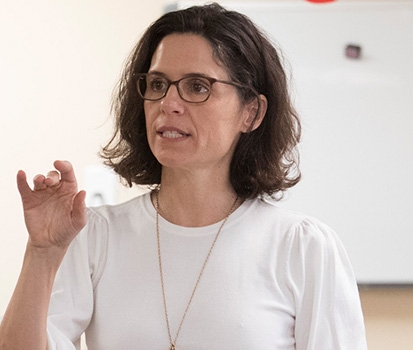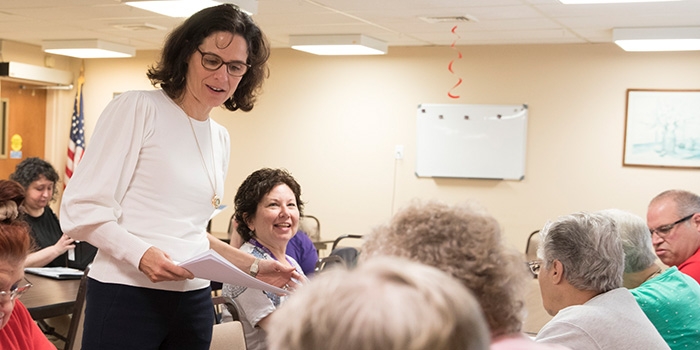Is Rhode Island Prepared for a Rapidly Aging Population?
- News & Events
- News
- Is Rhode Island Prepared for a Rapidly Aging Population?

By 2030, there won’t be a single baby boomer under the age of 65. By 2035, people 65 years and older will outnumber children for the first time in U.S. history.
“Rather than look at these demographics as a silver tsunami – some terrible disaster that’s about to befall us – we can look at it as a unique opportunity to tap into innovative ways to meet the changing needs of our communities,” said Jody Shue, director of Age-Friendly Rhode Island.
Age-Friendly Rhode Island is an initiative of Rhode Island College established in 2016, funded by the Tufts Health Plan Foundation and administered by the RIC Foundation. It consists of a coalition of stakeholders committed to building communities that support older Rhode Islanders as they age. As director, Shue helps coordinate the efforts of the working groups and extends their effectiveness statewide.
Shue explained that the work of Age-Friendly Rhode Island isn’t to go into a community and “make” it age-friendly. “What we try to do is facilitate conversations, present examples and pilot programming that local communities can take and run with,” she said.

In a few towns, Shue has engaged in listening sessions which allow residents to talk about their lived experience and express issues of concern. She then shared what she learned with elected officials or other partners in the community. Together, all parties developed a plan of action.
Shue noted that a number of cities, towns, counties (not in Rhode Island) and entire states have joined the AARP Network of Age-Friendly States and Communities. The network provides best practices, strategies and even grant funding to help communities become age-friendly.
Nationwide, more than 300 communities and three states (New York, Massachusetts and Colorado) have joined the network.
However a community doesn’t have to be a member of the network to embrace age-friendliness. In Barrington, Rhode Island, for example, citizens are working together to decide how they want to develop age-friendliness locally. One of the ideas is to create a virtual village – a community of mutual support.
“The way it would work is you would join the virtual village for a fee and get access to not only social events but assistance when you need it,” Shue explained. “It would be volunteer-driven. You could call and say, ‘Hi. I need help getting my air conditioner in the window.’ The call center would then line up a volunteer to come to your house and help you out.”
“One of the things that’s deeply ingrained in the age-friendly movement is that there’s no single right way to create an age-friendly community,” she said. “What an age-friendly community looks like is very much driven by the community itself, by what the community says is important to them. In other words, there are many models of age friendliness.”
A new initiative to build age-friendliness in the state will take place at Rhode Island College in the fall. An intergenerational service-learning course will be offered, where students spend in-class time learning how to work with older adults and out-of-class time matched with an older adult at a senior living facility.
“I think the academic environment is a great place to test out ideas,” Shue said. “We’re not only educating the workforce of tomorrow, we’re preparing students to think about this demographic in ways that will serve their careers and serve the people of Rhode Island.”

RIC, in fact, has been the main driver of the state’s age-friendly movement, said Shue. “Quite a lot of the research was first initiated at RIC as well as the grant writing and development of a strategic plan,” she said.
“Ultimately, the age-friendly movement drives everyone to think about the future in innovative ways,” Shue said. “Efforts to improve age-friendliness have been underway around the globe, thanks to the World Health Organization, AARP and many active stakeholders. We’ve got an opportunity to think differently here in Rhode Island.”
“Some of the questions we can ask ourselves are ‘How do we get a variety of stakeholders, who don’t necessarily have as their job description servicing seniors, to understand why thinking about this demographic makes sense? Where do we want to be as a state in 10 years and how can we think creatively about how to get there?’”
On Thursday, June 20, from 8 a.m.-noon, at Crowne Plaza Hotel, local thought-leaders will expand on the possibilities for an Age-Friendly Rhode Island and panelists will showcase age-friendly initiatives from inside Rhode Island and beyond at the Age-Friendly Rhode Island 2019 Summit. This event is free; however, registration is required by clicking here. For more information on Age-Friendly Rhode Island, go to https://agefriendlyri.org/.
